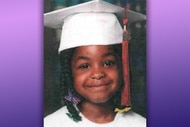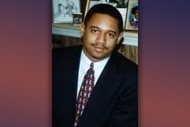Create a free profile to get unlimited access to exclusive videos, breaking news, sweepstakes, and more!
How Is Joy Fluker, Who Turned In Her Mother Anna Young For House of Prayer Deaths, Helping Others Speak Up?
“I cry over it. I felt some guilt over it, but I know it was the right thing to do,” Joy Fluker said of her decision to call the Alachua County Sheriff's Office in 2016 to report her mother Anna Young had killed a child in the 1980s while serving as leader of a strict religious community.

Joy Fluker had a dilemma. For years, growing up in the strict, cult-like religious community run by her mother, Anna Young, in rural Micanopy, Florida, she'd witnessed horrific abuse. Young ran the community with an iron fist, enforcing rigid discipline among its members in line with her interpretation of the Bible, and doling out harsh punishments for any infractions, including whippings and locking supposed offenders in cages.
She oversaw care for the all children living in the group and the abuse extended to them as well, with fatal results. Two children, Emon Harper and Katonya Jackson, died after being abused by Young during the community's heyday in the 1980s, though it would continue to exist into the '90s. Young managed to cover up the causes of those deaths and evade justice for decades, until her daughter made the fateful decision to turn her in.
On Dec. 27, 2016, Fluker placed a desperate call to the Alachua County Sheriff’s Office, struggling with the internal conflict of whether to report the crimes she suspected her mother was responsible for.
“How can I snitch on my mom?” a nervous Fluker can be heard in a recording of the call, featured in the UCP podcast “The Followers: House of Prayer,” which chronicles the legacy of abuse within the group. “I don’t know if I am doing the right thing. Like is this something that a family is never supposed to tell?”
The call would trigger a lengthy investigation and ultimately lead to Young’s arrest. Earlier this year, the 79-year-old pleaded no contest to second-degree murder in the death of young Emon, who was starved and beaten to death, and manslaughter for the death of Katonya, who died after being denied her seizure medication. She was sentenced to 30 years behind bars, but died last month just 42 days into her prison sentence, according to the New York Daily News.
That firsthand knowledge of the difficulty in turning in a loved one served as the driving force behind Fluker's nonprofit Prevent the Pain.
“Prevent the Pain, the essence of it, is to encourage those people to speak up. We can prevent so much pain in doing so,” Fluker told Oxygen.com.
According to the organization's website, its mission is “to support unspoken victims brave enough to speak up at all cost to stop someone they love or care for from causing pain to themselves or another.”
At the time of her call in 2016, Fluker felt her mother was interfering with her own parenting and intruding too deeply into her own children’s lives.
“I have my own children now and my mom and I will constantly have friction and issues regarding her undermining my authority and I always attributed it to her being just an overprotective grandmother loving her grandchildren,” she said.
Fluker was also haunted by vague memories of Harper being locked in a small closet, close to death, while she lived at the religious community.
Her older siblings had also told her own half-sister, Catherine Davidson, had died in a similar manner in a closet in 1973, years before Young started the House of Prayer.
“I learned that mom had punished her and put her a broom closet, a small broom closet,” Fluker told Oxygen.com, adding that she had tied the child hands behind her back with duct tape and eventually put duct tape over her mouth too because “she was screaming so.”
Fluker hadn't been born at the time, but her older sister remembers hearing Davidson scratching against the closet walls until “eventually the scratching stopped.”
Fluker told Oxygen.com that the next morning Davidson was found dead in the closet. Her family later reported her missing on Sept. 1, 1973 to the Michigan State Police, claiming the 6-year-old had gone missing during a family trip to the Warren Dunes State Park, according to a police report obtained by Oxygen.com.
Authorities were never able to find any trace of the girl and the case remains open to this day.
While the case never reached any legal conclusions, Fluker said the story she had heard from her older siblings, combined with her own memories of Harper struggling in a closet, pushed her over the edge one day during a fight with her mom.
“In the middle of an argument, I blurted out, you know, 'How can you tell me how to raise my children, when you killed two children?'” she said. “In saying that, I saw the look on her face and it was I look I hadn’t seen since I was a child, and I knew that what I said was real.”
With the accusation finally out in the air, Fluker said she could no longer ignore what she had always secretly suspected.
“After I said it, there was no turning back,” she said. “I couldn’t, you know, unsay what I said. I couldn’t turn around from the path I went down and I couldn’t live with myself after knowing for a fact that she really did kill those children.”
The realization prompted Fluker to make the call to authorities, despite still loving her mother.
There were some in her family who didn’t understand her decision and questioned how she could tell authorities the dark secrets of Young’s past, but Fluker has remained steadfast that turning her mother in was the right thing to do.
“I cry over it. I felt some guilt over it, but I know it was the right thing to do,” she said. “I know at first it was like all these questions rattling in my head, but I know if I had to do it all over again I would do it, but I would have done it sooner.”
Her struggle also made her realize there may be others facing similar dilemmas, prompting her to start the nonprofit organization.
“I realized that there might be a lot of crimes out there, a lot of cold cases, especially, where there are family members, friends, loved ones who know who did it but they are not thinking about the suffering of all people that that life impacted,” she said. “They are just thinking about their individual relationship with this person and in doing so they are causing more pain.”
Fluker believes speaking up not only helps the victims and their families, but can also provide relief to the perpetrator who may be carrying their own sense of guilt.
“You can help the person who you feel you love the most by getting the person the help they need before they do it again,” she said.
Fluker said the organization will provide counseling resources for those struggling with their decision to come forward and provide opportunities to connect with others who have faced similar choices to try to learn about how to cope with the agonizing decision.
“I want to use this to help others see this and say [it] is not going to happen in my family,” she said. “I have to stop it now.”
Fluker said she was “relieved” her mom took the plea deal offered by prosecutors and didn’t force the family members of her victims to relive their memories in a court room.
“Even though I know she pleaded no contest, in her heart she knows what she did,” Fluker said. “Even though her reasoning may or may not be for the right reasons, I do believe this has brought some closure to those families.”
To learn more about the case, tune in to “The Followers: House of Prayer” podcast at UCPAudio.com or anywhere you normally listen to your podcasts.
-Stephanie Gomulka contributed to this report.



























